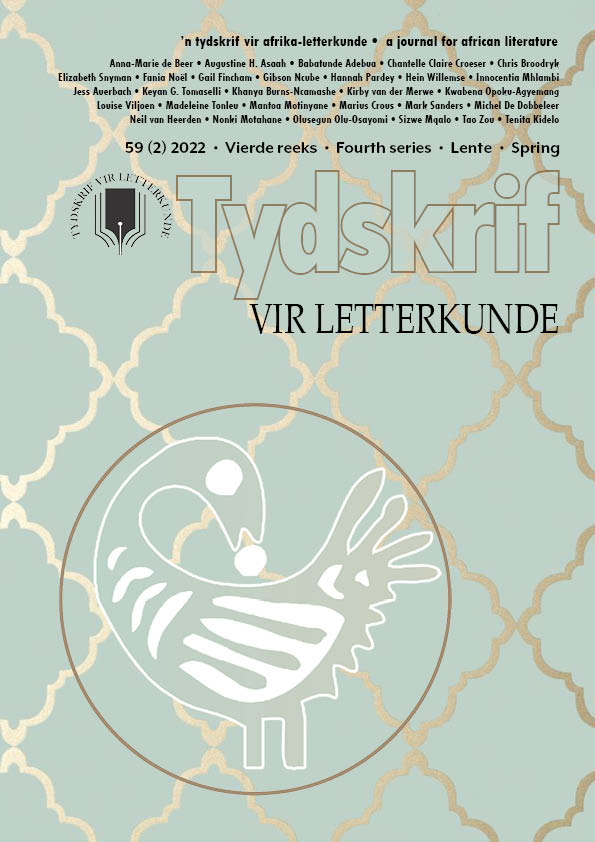Orisa Sanponna : systèmes de santé indigènes, handicap et moralité dans la dramaturgie d'Osofisan
DOI :
https://doi.org/10.17159/tl.v59i2.11931Mots-clés :
Orisa Sanponna, Yoruba, moralité, systèmes de santé indigènes, handicap, `Femi Osofisan, religion traditionnelle africaine, médecine, lèpreRésumé
La pertinence de la littérature indigène (on entend par là la littérature africaine) en tant que ressource importante pour l'interrogation et la compréhension de la construction sociale du corps, de la maladie ou du bien-être dans le contexte africain semble ne pas être d'un intérêt primordial pour la plupart des chercheurs africains dans le domaine de la sociologie de la santé. Dans cet article, nous explorons comment la notion de Sanponna (la divinité de la variole) décrite dans la pièce de Femi Osofisan, Esu and the Vagabond Minstrels, peut être intégrée dans les systèmes de santé indigènes et d'invalidité d'une manière qui reconnaît les faits biologiques et sociaux, et comment cette expérience peut être interrogée dans le domaine des fondements et des préoccupations épistémologiques, ontologiques et morales. Notre fondement théorique s’appuie sur des approches mythologiques et analytiques. Nous commençons par une brève explication du concept et du potentiel de Sanponna dans la métaphysique Yoruba. Nous recherchons également les relations entre les valeurs morales et les autres dimensions socio-psychologiques et la signification traditionnelle du handicap. Par la suite, nous examinons brièvement Orisa Sanponna et ses impacts possibles sur les personnages et le handicap dans Esu and the Vagabond Minstrels et nous concluons par une explication de la pertinence des thèmes explorés par Osofisan dans la pièce pour l'expérience et la situation contemporaines du Nigeria.
Téléchargements
Références
Ademeso, Adebola Adebambo. “National Development and the Concept of Compassion in Osofisan’s Esu and the Vagabond Minstrels.” Emerging Perspectives on Femi Osofisan, edited by Tunde Akinyemi & Toyin Falola. Africa World, 2009, pp. 54–63.
Adeniyi, Victoria O. “Religion, Corruption and Democratic Nigeria in Femi Osofisan’s Drama.” Emerging Perspectives on Femi Osofisan, edited by Tunde Akinyemi & Toyin Falola. Africa World, 2009, pp. 151–65.
Adeoti, Gbemisola. “The Trope of the Market in Femi Osofisan’s Dramaturgy.” Emerging Perspectives on Femi Osofisan, edited by Tunde Akintunde & Toyin Falola. Africa World, 2009, pp. 387–408.
Akinyemi, Akintunde. “Deities: The Orisa.” Encyclopedia of the Yoruba, edited by Toyin Falola & Akintunde Akinyemi. Bloomington U P, 2016, pp. 84–5.
Asakitikpi, Alex E. “Engaging in Life’s Dialogue: A Sociological Interpretation of the Notion of Abiku in the Works of Soyinka, Clark and Okri.” Re-Visioning Humanistic Studies, edited by Agwonorobo E. Eruvbetine & Udu Yakubu. African Cultural Institute, 2009, pp. 65–80.
Boston, John S. “The Supernatural Aspects of Disease and the Therapeutics among the Igala.” Studies in Third World Societies vol. 19, no. 2, 1982, pp. 29–42.
Douglas, Mary. Purity and Danger: An Analysis of the Concepts of Pollution and Taboos. Routledge & Kegan Paul, 1966.
Ezeabasili, Nkankwo. “Traditional Ibo ideas about Diseases and Treatment.” Studies in Third World Societies vol. 19, no. 2, 1982, pp. 17–28.
Freund, Peter. The Civilized Body. Temple U P, 1982.
Freund, Peter & Meredith McGuire. Health, Illness and the Body: A Critical Sociology. Prentice Hall, 1991.
Freidson, Eliot L. Profession of Medicine: A Study of the Sociology of Applied Knowledge. Dodd Meal, 1970.
Gabe, Jonathan, Mike Bury & Mary Ann Elston. Key Concepts in Medical Sociology. Sage, 2004.
Goffman, Erving. The Presentation of Self in Everyday Life. Penguin, Routledge & Kegan Paul, 1959.
Idowu, E. Bolaji. Olodumare God in Yoruba Belief. Longmans, 1962.
Johnson-Bashua, Adépéjú. “Healing.” Encyclopedia of the Yoruba, edited by Toyin Falola & Akintunde Akinyemi. Bloomington U P, 2016, pp. 146–7.
Kelly, Michael Paul & David Field. “Medical Sociology, Chronic Illness and the Body.” Sociology of Health and Illness vol. 18, no. 2, 1996, pp. 241¬¬–57.
Lawler, Jocalyn. Behind the Screens: Somology and the Problem of the Body. Churchill Livingston, 1991.
Locker, David. Disability and Disadvantage: The Experience of Chronic Illness. Tavistock, 1983.
Onanuga, Ayobami & Paul Onanuga. “Individualism and the Erosion of African Communality: Exploring Drama for Societal Change in Femi Osofisan’s Plays.” Imbizo vol. 12, no. 1, 2021, pp. 1–20. DOI: https://doi.org/10.25159/2663-6565/7751.
Mathieson, Cynthia M. & Henderikus J. Stam. “Renegotiating Identity: Cancer Narratives”. Sociology of Health & Illness vol. 17, no. 3, 1995, pp. 283–306. DOI: https://doi.org/10.1111/1467-9566.ep10933316.
Osofisan, Femi. Esu and the Vagabond Ministrels. A Fertility Rite for the Modern Stage. New Horn, 1988.
Sesan, Akinwunmi Azeez. “In Search of the Nation: A Reading of Femi Osofisan’s Esu and the Vagabond Minstrels.” Marang: Journal of Language and Literature vol. 31, 2019, pp. 75–87. https://journals.ub.bw/index.php/marang/article/view/1638.
Simpson, George E. Yoruba Religion and Medicine in Ibadan. Ibadan U P, 1994.
Turner, Bryan S. The Body and Society. Blackwell, 1974.
Turner, Bryan S. Regulating Bodies: Essays in Medical Sociology. Routledge, 1992.
Téléchargements
Publiée
Numéro
Rubrique
Licence
(c) Copyright Tydskrif vir Letterkunde 2022

Ce travail est disponible sous licence Creative Commons Attribution - Partage dans les Mêmes Conditions 4.0 International.


 https://orcid.org/0000-0001-6465-6584
https://orcid.org/0000-0001-6465-6584


.png)